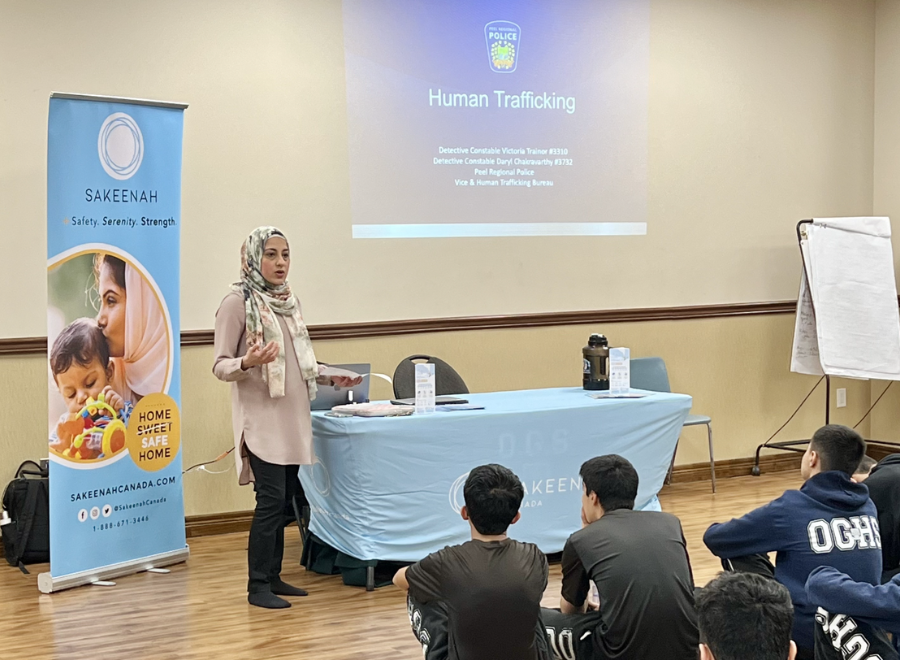For years, employees at Sakeenah Canada, a national Muslim charity that supports women and children escaping violence, have been coming into contact with survivors of various forms of human trafficking. But many of the women don’t see themselves as victims, as a lack of awareness about what human trafficking entails can play a role in people normalizing their situations. Meanwhile, those who are aware they are being exploited often don’t seek help due to the stigma in the Muslim community around human trafficking.
As a solution, Sakeenah Canada launched the country’s first anti-human trafficking program tailored to Muslims in January. The program offers in-person and remote support to women and girls who need help leaving exploitative situations, all from a religiously and culturally sensitive lens. The team also organizes workshops that include perspectives from community experts, presentations and webinars to create awareness about human trafficking for parents, teachers, students and the general public, both inside and outside the Muslim community.
You may unsubscribe from any of our newsletters at any time.
“There’s a lot of denial in our community about trafficking,” says anti-human trafficking program coordinator Sumayyah Mahmood. “It’s a hidden problem, and the community is not ready to talk about it at all.”
Since police reports of human trafficking cases don’t capture religious information about victims, there are currently no statistics available about the number of Muslims affected. However, human trafficking is one of Canada’s fastest growing crimes, affecting people from every socioeconomic, racial and religious background.
Between 2012 and 2022, Statistics Canada reported a steady increase in police-reported human trafficking cases, totalling approximately 4,000. However, the real number is believed to be much higher, as many victims do not report the crime due to shame or trauma. The Global Slavery Index estimates that 69,000 people in Canada are currently trapped in situations of modern slavery and forced marriages.
More on Broadview:
Human trafficking predominantly affects women and girls, with sex trafficking — the use of force or threats to provide sexual services — being the most common form of exploitation. Other forms include forced labour, domestic servitude and forced marriage. The average age of recruitment is 13 years old. Vulnerable groups, including new immigrants and racialized people are disproportionately affected, with women of colour estimated to make up 42 percent of trafficked women.
“Because human trafficking is such a silent crime, and sometimes they’ve been in that life for so long, it becomes difficult [for the victims connecting with Sakeenah] to notice that they are being trafficked,” says Laila Alfadhli, a University of Ottawa bachelor of science graduate who approached Sakeenah in 2022 to see how she could make a difference in the lives of Muslim women as part of a year-long fellowship.

Alfadhli learned that since human trafficking victims didn’t recognize that they were being exploited or convey that information to Sakeenah, and there was no process in place for staff to determine what was really happening, many were not getting directed to the right resources. So starting in spring last year, she worked closely with the charity to create a trauma-informed, religiously and culturally sensitive intake form that would prevent trafficking victims from falling through the cracks. She also collaborated with Sakeenah to create a roadmap for how to assist victims. Her work led to the launch of the program.
But while Sakeenah’s educational seminars have helped spread awareness, there has been pushback. Mahmood says when she initially reached out to an Islamic high school in Ontario’s ethnically diverse Peel region to schedule a workshop, some teachers didn’t want them to come. “‘It’s in the secular community,’ they said. ‘Why do we need to talk about this?’” But the workshop ended up being well-received by both teachers and students.
Const. Daryl Chakravarthy, who works with Peel Regional Police’s vice and human trafficking unit, was a speaker at the workshop. “There’s a lot more awareness that is needed,” Chakravarthy says. “We want our young girls to know what [trafficking] is, but it’s also important for young boys to know, too, so they can be aware of how it victimizes people, protect the people they care about, and not unknowingly participate in the exploitation of someone else.”
In their presentations, Mahmood and Alfadhli dispel the myth that traffickers are typically strangers, explaining that they are often family members or intimate partners.
They also highlight the common signs of trafficking. For example, in cases of forced labour (and often in forced marriages as well) people may have their financial documents or government ID taken away, their movements restricted, be denied payment for work, or be forced to work or perform sexual acts against their will.
Alfadhli adds that, despite common misconceptions, the signs of sex trafficking are similar across different communities. “It’s all the same signs [parents should watch out for], such as if your child’s personality changes out of nowhere … or is staying out late at night,” she says. Other signs can include new or increased substance use, unexplained access to cash, overtly sexual behaviour, a new social circle that includes older friends, and the use of two cell phones.
Mahmood says she learned about a case in which two Muslim girls — both straight-A students — were found to be involved in sex trafficking. “One of them wore a hijab, and was [considered] the ‘perfect daughter.’ When the parents found out, they were in absolute shock and couldn’t believe it.”
Sakeenah’s anti-human trafficking work is already starting to make an impact on the wider community. The nonprofit was the only Muslim organization invited to participate in a symposium on combating child trafficking organized by Toronto Metropolitan University (TMU). The institution is also launching a new master of health sciences program that will allow students to learn about child trafficking in a culturally inclusive way.
Jennifer Martin, associate dean in TMU’s faculty of community services, says she’s excited to incorporate Sakeenah’s unique insights, as well as those from other diverse organizations, into the curriculum. “It will give graduates a level of sensitivity and the ability to work in — and understand — the vulnerabilities within communities,” she says, adding that they can then “share that knowledge across different communities in Ontario and Canada.”
***
Sanam Islam is a freelance journalist in the Greater Toronto Area.














